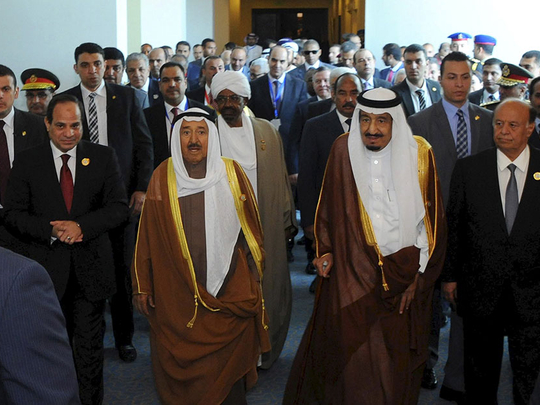
Until very recently, the very idea that there would be unity of purpose within the Arab World was simply wishful thinking, primarily because states preferred to maintain their own domestic and foreign policy priorities. The word ‘unity’ was bandied about but remained just that, a word. It took various crises impacting a number of Arab countries affecting regional security to galvanize Arab League member states, in particular predominantly Sunni States, to set aside differences for the greater good.
The blossoming of this sea change was highly visible during Egypt’s Economic Development Conference held earlier this month. The outpouring of moral and financial support from the country’s Arab allies was so overwhelming it literally brought tears to the eyes of the Egyptian Prime Minister, Ibrahim Malab. It further signified an invitation to the most populous Arab country to resume its leadership role and provided a positive forum conducive to new bridges being built and fences mended between countries whose relations had suffered strains.
Another strong indication that togetherness is flowering came in the form of the diplomatic and military backing afforded to the Saudi-led military intervention in Yemen to restore the embattled legitimate president, Abd-Rabbu Mansour Hadi, to free the Yemeni people from the strangulation of Houthi militias, armed and funded by the Islamic Republic of Iran - and to protect the strategic Bab el Mandeb that links to the Suez Canal as well as the Gulf of Aden and Indian Ocean. Operation ‘Decisive Storm” has been blessed by the majority of Arab leaderships; notable exceptions are those countries that have fallen under the sway of Iranian proxies, such as Lebanon, Syria and Iraq.
President Hadi’s emotional appeal for assistance was answered promptly by Saudi Arabia, its Gulf allies as well as Egypt, Jordan, Morocco, Sudan and Pakistan, which caught the powers that be in Iran by surprise. The difference between this Arab intervention and previous conflicts in which Arab states have been involved is significant. This was a decision independently taken without referral to western powers or the snail-like United Nations Security Council. While it so happens that the Obama administration has signaled its approval and is offering intelligence and logistical support, no permission from the White House was sought.
It’s no secret that Arab leaderships have lost confidence in the ability of Western powers to help resolve the deteriorating situations in Yemen, Syria, Iraq and Libya. That is the prevailing view throughout most of the Arab World, reflected by several Arab heads of state during their addresses to delegates attending the recent Arab League Summit in Sharm el-Sheikh.
The Saudi monarch King Salman bin Abdelaziz Al Saud acknowledged “the painful reality” that many Arab states are enduring conflict, sectarianism, bloodshed and foreign intervention. The Emir of Kuwait, Sheikh Jaber Al-Ahmad Al-Sabah, criticised the international community for its inaction. Secretary-General of the Arab League Nabil el-Arabi pointed a finger at the United Nations for abandoning its responsibilities vis-à-vis the continuing occupation of Palestine and condemned the international community for failing in its efforts to end to the bloodshed in Syria, for which UN Secretary-General Ban Ki-Moon confessed his “shame and anger”.
Arab leaders further agree on the need to combat terrorism and extremist ideologies. The Egyptian President Abdel-Fattah Al Sissi was emphatic on this point. The very identity of “our nation” and the “fabric of our societies” are being threatened by terrorists who’ve torpedoed our religious values to achieve territorial and political gains, he said.
The Egyptian leader has championed the formation of a defensive Joint Arab Force in compliance with international law to protect any Arab country besieged by terrorist groups or undermined by “ferocious foreign interventions”. The leaders of participating countries are expected to meet together within weeks to thrash out the details.
Such a force, armed with sophisticated weaponry, air-power and manpower, will trigger a paradigm shift in the regional balance of power and will, hopefully, stop Iran’s ambitions to revive a new Persian Empire in their tracks. During the summit Iran was rarely mentioned by name but it was on the minds of speakers using the diplomatic euphemism ‘foreign power’. In large part, Iran’s overreach and the boasts of its high officials that Tehran now controls four Arab capitals are responsible for this new Arab synergy.
Finally, a page has seemingly been turned on Egyptian-Qatari relations, proof that colliding interests and goodwill can triumph over old hurts. President Al Sissi waited for the Qatari Emir Sheikh Tamim bin Hamad Al-Thani at the airport and greeted him warmly. For his part, Sheikh Tamim pledged support in all sectors to “his brother, President Abdel-Fattah el-Sisi’s country”. That’s Arab unity in action!
Linda S. Heard is a specialist writer on Middle East affairs. She can be contacted at lheard@gulfnews.com









